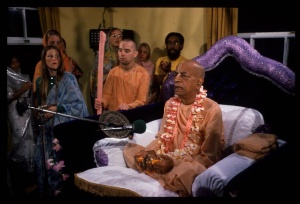CC Madhya 20.310 (1975): Difference between revisions
(Vanibot #0027: CCMirror - Mirror CC's 1996 edition to form a basis for 1975) |
(Vanibot #0020: VersionCompareLinker - added a link to the Version Compare feature) |
||
| Line 2: | Line 2: | ||
<div style="float:left">'''[[Sri Caitanya-caritamrta (1975)|Śrī Caitanya-caritāmṛta (1975)]] - [[CC Madhya (1975)|Madhya-līlā]] - [[CC Madhya 20 (1975)|Chapter 20: Lord Śrī Caitanya Mahāprabhu Instructs Sanātana Gosvāmī in the Science of the Absolute Truth]]'''</div> | <div style="float:left">'''[[Sri Caitanya-caritamrta (1975)|Śrī Caitanya-caritāmṛta (1975)]] - [[CC Madhya (1975)|Madhya-līlā]] - [[CC Madhya 20 (1975)|Chapter 20: Lord Śrī Caitanya Mahāprabhu Instructs Sanātana Gosvāmī in the Science of the Absolute Truth]]'''</div> | ||
<div style="float:right">[[File:Go-previous.png|link=CC Madhya 20.309 (1975)|Madhya-līlā 20.309]] '''[[CC Madhya 20.309 (1975)|Madhya-līlā 20.309]] - [[CC Madhya 20.311 (1975)|Madhya-līlā 20.311]]''' [[File:Go-next.png|link=CC Madhya 20.311 (1975)|Madhya-līlā 20.311]]</div> | <div style="float:right">[[File:Go-previous.png|link=CC Madhya 20.309 (1975)|Madhya-līlā 20.309]] '''[[CC Madhya 20.309 (1975)|Madhya-līlā 20.309]] - [[CC Madhya 20.311 (1975)|Madhya-līlā 20.311]]''' [[File:Go-next.png|link=CC Madhya 20.311 (1975)|Madhya-līlā 20.311]]</div> | ||
{{CompareVersions|CC|Madhya 20.310|CC 1975|CC 1996}} | |||
{{RandomImage}} | {{RandomImage}} | ||
==== TEXT 310 ==== | ==== TEXT 310 ==== | ||
| Line 20: | Line 19: | ||
<div class="synonyms"> | <div class="synonyms"> | ||
kṣīram—milk; yathā—as; dadhi—yogurt; vikāra-viśeṣa—with a special transforming agent; yogāt—by mixing; sañjāyate—is transformed into; na—not; tu—but; tataḥ—from the milk; pṛthak—separated; asti—is; hetoḥ—which is the cause; yaḥ—who; śambhutām—the nature of Lord Śiva; api—even though; tathā—as; samupaiti—accepts; | kṣīram—milk; yathā—as; dadhi—yogurt; vikāra-viśeṣa—with a special transforming agent; yogāt—by mixing; sañjāyate—is transformed into; na—not; tu—but; tataḥ—from the milk; pṛthak—separated; asti—is; hetoḥ—which is the cause; yaḥ—who; śambhutām—the nature of Lord Śiva; api—even though; tathā—as; samupaiti—accepts; kāryāt—from the matter of some particular business; govindam—unto Govinda, the Supreme Personality of Godhead; ādi-puruṣam—the original person; tam—unto Him; aham—I; bhajāmi—offer my respectful obeisances. | ||
</div> | </div> | ||
| Line 27: | Line 26: | ||
<div class="translation"> | <div class="translation"> | ||
" 'Milk changes into yogurt when mixed with a yogurt culture, but actually it is constitutionally nothing but milk. Similarly, Govinda, the Supreme Personality of Godhead, assumes the form of Lord Śiva [Śambhu] for the special purpose of material transactions. I offer my obeisances at His lotus feet.' | |||
</div> | </div> | ||
| Line 34: | Line 33: | ||
<div class="purport"> | <div class="purport"> | ||
This is a quotation from | This is a quotation from Brahma-saṁhitā (5.45). | ||
</div> | </div> | ||
Latest revision as of 13:13, 27 January 2020

A.C. Bhaktivedanta Swami Prabhupada
TEXT 310
- kṣīraṁ yathā dadhi vikāra-viśeṣa-yogāt
- sañjāyate na tu tataḥ pṛthag asti hetoḥ
- yaḥ śambhutām api tathā samupaiti kāryād
- govindam ādi-puruṣaṁ tam ahaṁ bhajāmi
SYNONYMS
kṣīram—milk; yathā—as; dadhi—yogurt; vikāra-viśeṣa—with a special transforming agent; yogāt—by mixing; sañjāyate—is transformed into; na—not; tu—but; tataḥ—from the milk; pṛthak—separated; asti—is; hetoḥ—which is the cause; yaḥ—who; śambhutām—the nature of Lord Śiva; api—even though; tathā—as; samupaiti—accepts; kāryāt—from the matter of some particular business; govindam—unto Govinda, the Supreme Personality of Godhead; ādi-puruṣam—the original person; tam—unto Him; aham—I; bhajāmi—offer my respectful obeisances.
TRANSLATION
" 'Milk changes into yogurt when mixed with a yogurt culture, but actually it is constitutionally nothing but milk. Similarly, Govinda, the Supreme Personality of Godhead, assumes the form of Lord Śiva [Śambhu] for the special purpose of material transactions. I offer my obeisances at His lotus feet.'
PURPORT
This is a quotation from Brahma-saṁhitā (5.45).